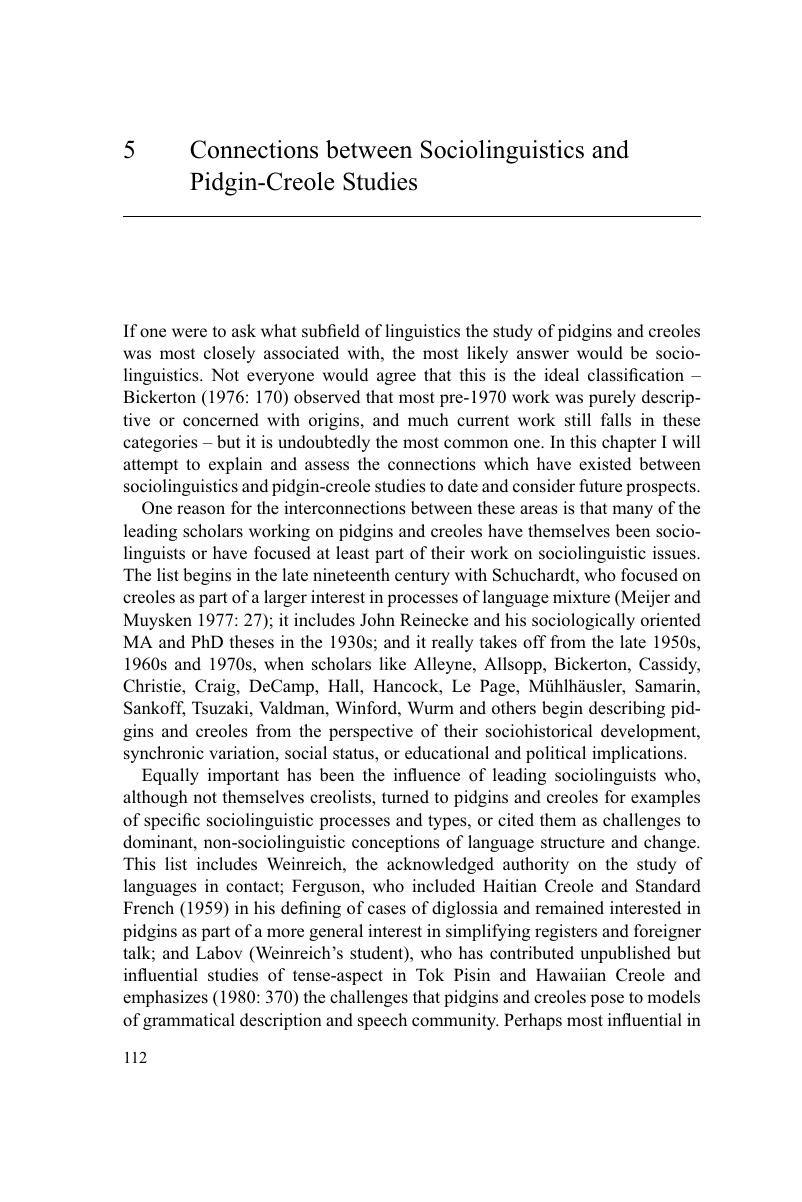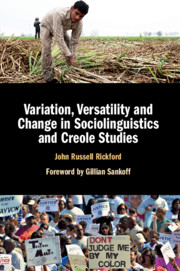Book contents
- Variation, Versatility and Change in Sociolinguistics and Creole Studies
- Variation, Versatility and Change in Sociolinguistics and Creole Studies
- Copyright page
- Dedication
- Contents
- Figures
- Tables
- Foreword
- Acknowledgments
- Introduction
- Chapter 1 Sociolinguistic Fieldwork in a Racial and Political Maelstrom
- Chapter 2 Symbol of Powerlessness and Degeneracy, or Symbol of Solidarity and Truth?
- Chapter 3 “Me Tarzan, You Jane!”
- Chapter 4 The Haves and Have Nots
- Chapter 5 Connections between Sociolinguistics and Pidgin-Creole Studies
- Chapter 6 Implicational Scales
- Chapter 7 Variation and the Versatility Approach to Language Arts in Schools and Societies
- Chapter 8 Le Page’s Theoretical and Applied Legacy in Sociolinguistics and Creole Studies
- Chapter 9 The Social and the Linguistic in Sociolinguistic Variation
- Chapter 10 A Variationist Approach to Subject–Aux Question Inversion in Bajan and Other Caribbean Creole Englishes, AAVE and Appalachian
- Chapter 11 Situation
- Chapter 12 Language and Linguistics on Trial
- Chapter 13 The Continuing Need for New Approaches to Social Class Analysis in Sociolinguistics
- Chapter 14 Concord and Conflict in the Speech Community
- Chapter 15 The Joy of Sociolinguistic Fieldwork
- Afterword, with a Poem by Rachel Jeantel
- Index
- References
Chapter 5 - Connections between Sociolinguistics and Pidgin-Creole Studies
Published online by Cambridge University Press: 22 January 2019
- Variation, Versatility and Change in Sociolinguistics and Creole Studies
- Variation, Versatility and Change in Sociolinguistics and Creole Studies
- Copyright page
- Dedication
- Contents
- Figures
- Tables
- Foreword
- Acknowledgments
- Introduction
- Chapter 1 Sociolinguistic Fieldwork in a Racial and Political Maelstrom
- Chapter 2 Symbol of Powerlessness and Degeneracy, or Symbol of Solidarity and Truth?
- Chapter 3 “Me Tarzan, You Jane!”
- Chapter 4 The Haves and Have Nots
- Chapter 5 Connections between Sociolinguistics and Pidgin-Creole Studies
- Chapter 6 Implicational Scales
- Chapter 7 Variation and the Versatility Approach to Language Arts in Schools and Societies
- Chapter 8 Le Page’s Theoretical and Applied Legacy in Sociolinguistics and Creole Studies
- Chapter 9 The Social and the Linguistic in Sociolinguistic Variation
- Chapter 10 A Variationist Approach to Subject–Aux Question Inversion in Bajan and Other Caribbean Creole Englishes, AAVE and Appalachian
- Chapter 11 Situation
- Chapter 12 Language and Linguistics on Trial
- Chapter 13 The Continuing Need for New Approaches to Social Class Analysis in Sociolinguistics
- Chapter 14 Concord and Conflict in the Speech Community
- Chapter 15 The Joy of Sociolinguistic Fieldwork
- Afterword, with a Poem by Rachel Jeantel
- Index
- References
Summary

- Type
- Chapter
- Information
- Publisher: Cambridge University PressPrint publication year: 2019



